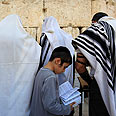
Orthodox monopoly ending?
Op-ed: Israeli society increasingly more open to different kinds of Jewish identities
A well-known dictum cultivated by generations of politicians and Orthodox party functionaries argued that the synagogues which secular Israelis do not attend are Orthodox – that is, seculars do not go to synagogue, yet if they did, it would be to a “real” and “authentic” synagogue, that is, an Orthodox one. This was convenient and made it possible to create the impression that non-Orthodox Jewish streams are irrelevant to Israeli reality; as though they are an import, a foreign element.
It was a patronizing statement, replete with authoritarianism, provinciality, and sectarian chauvinism, yet it mostly absolved the heads of the Orthodox sector - the haredim and religious Zionists – from coping with the pluralistic Jewish doctrine, which characterized and still typifies most Jews living outside of Israel.
However, this era has come to an end. One poll after another in recent years show that the Israeli public has changed; that it has become more open in terms of its Jewish identity to a much greater extent than some people want us to know, that it does not fear different models of Jewish practice, and that it is happy to experience them.
This is attested to by the growing number of Masorati communities nationwide, the flourishing Reform communities, the secular houses of prayer, and numerous other examples. Those who sought more proof got it via a survey published on the eve of Sukkoth by the Ministry of Hasbara and Diaspora Affairs. According to the poll, 63% of Israelis would accept converts who underwent a non-orthodox conversion process as Jews in every way.
This marked a significant increase from a previous poll, which also showed impressive tolerance. Back then, about three years ago on Passover eve, Dr. Mina Tzemach published a wide-ranging survey showing that 45% of the public supports the recognition of Reform and Conservative conversions. Not much time has passed since then, and we now see the support for ending the Orthodox monopoly skyrocketing.
Pluralism instead of fundamentalism
This is no coincidence. In Jewish terms, Israeli society is maturing for the better. Many Israelis are reclaiming ownership of their Jewish identity. The religious-secular dichotomy has passed away, while making way for diverse Jewish identities that are no longer scared of themselves or of others.
The discourse is changing too. A new kindergarten was opened in one of the Masorti Movement’s communities in northern Jerusalem. The community’s female rabbi, Rabba Chaya Rowen Baker, told the children a story featuring a rav (male rabbi). When she finished, one of the children raised a hand and asked: What’s a rav? She thought about it for a moment and replied: A rav is a rabba who is a man.
This anecdote is amusing, but also telling. Did you notice how many times in recent years we had seen female rabbis appearing on television and being interviewed by the press? Suddenly it is becoming clear that if women can perform any job, and if a woman is a university professor or a brain surgeon, there is no reason to prevent her from becoming a rabbi. This was not the case 10 years ago.
This welcome process, on all fronts, must continue. It is a harbinger of a better Israel; a more Jewish and more democratic Israel. Pluralism instead of fundamentalism. This trend had not yet been manifested politically, yet this too shall happen.
Attorney Yizhar Hess is the Director-General of the Masorati Movement in Israel
- Follow Ynetnews on Facebook










